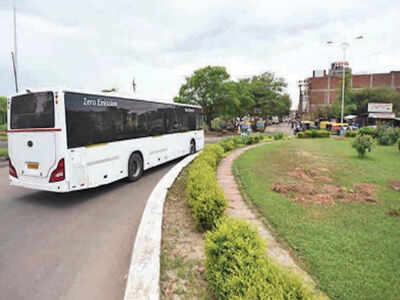
CHANDIGARH: After scrapping the earlier tender, the UT administration has now floated a fresh bid for 40 electric buses and charging stations in the city.
A project planned in 2016 has been delayed due to various reasons. Recently, the tender process was scrapped after the officials found out that the bid of running the buses at Rs 74 per km was too high. The transport department officials had visited Pune and found electric buses running there at Rs 56/km. A suggestion was made in the report to cancel the tender. An agenda to float a fresh quotation was recently approved and accordingly a fresh bid was floated.
"The lowest bidder had quoted Rs 74/km per bus, a rate found to be on the higher side. According to the tender conditions, the successful bidder will purchase and run the buses on his own and maintain them for 10 years. The administration will only provide conductors, parking areas and charging stations. Finally, a new tender was floated in which companies can participate till February 24," a senior UT official said.
UT administrator V P Singh Badnore had approved the project in November 2016. The Chandigarh Transport Undertaking (CTU) had tried to put the project in motion, but since the budgetary estimate was Rs 32 crore, the administration had sought financial support from the Union government.
The cost of each electric bus ranges between Rs 1.25 crore and Rs 1.40 crore. They were planned to be bought under a Central government scheme in which 60% of the cost would be borne by the ministry of heavy industries and public enterprises. Accordingly, the administration had written to the Union ministry of heavy industries and public enterprises, but the request was rejected. The administration had then decided to buy electric buses on its own to fight air pollution.
Over the years, the quality of air in the city has deteriorated beyond permissible level. Data compiled by the Chandigarh Pollution Control Committee (CPCC) points out that the level of repairable suspended particulate matter (RSPM) has been recorded above permissible limits, that is, 100 microgram per cubic metre (mcg/cu m).
In August 2017, the UT administration had test driven buses from various companies. A weight of 1,750 kg was put in the buses and an 11-member team was constituted for inspection and compiling a report. Based on the report of the team, the authorities took the decision to purchase battery-operated buses. According to officials, the battery-operated buses have a life span of 10 years and cover over 250km in one charge. It takes around six hours to charge a bus.
A project planned in 2016 has been delayed due to various reasons. Recently, the tender process was scrapped after the officials found out that the bid of running the buses at Rs 74 per km was too high. The transport department officials had visited Pune and found electric buses running there at Rs 56/km. A suggestion was made in the report to cancel the tender. An agenda to float a fresh quotation was recently approved and accordingly a fresh bid was floated.
"The lowest bidder had quoted Rs 74/km per bus, a rate found to be on the higher side. According to the tender conditions, the successful bidder will purchase and run the buses on his own and maintain them for 10 years. The administration will only provide conductors, parking areas and charging stations. Finally, a new tender was floated in which companies can participate till February 24," a senior UT official said.
UT administrator V P Singh Badnore had approved the project in November 2016. The Chandigarh Transport Undertaking (CTU) had tried to put the project in motion, but since the budgetary estimate was Rs 32 crore, the administration had sought financial support from the Union government.
The cost of each electric bus ranges between Rs 1.25 crore and Rs 1.40 crore. They were planned to be bought under a Central government scheme in which 60% of the cost would be borne by the ministry of heavy industries and public enterprises. Accordingly, the administration had written to the Union ministry of heavy industries and public enterprises, but the request was rejected. The administration had then decided to buy electric buses on its own to fight air pollution.
Over the years, the quality of air in the city has deteriorated beyond permissible level. Data compiled by the Chandigarh Pollution Control Committee (CPCC) points out that the level of repairable suspended particulate matter (RSPM) has been recorded above permissible limits, that is, 100 microgram per cubic metre (mcg/cu m).
In August 2017, the UT administration had test driven buses from various companies. A weight of 1,750 kg was put in the buses and an 11-member team was constituted for inspection and compiling a report. Based on the report of the team, the authorities took the decision to purchase battery-operated buses. According to officials, the battery-operated buses have a life span of 10 years and cover over 250km in one charge. It takes around six hours to charge a bus.
Trending Topics
LATEST VIDEOS
City
 Accused killed woman, her children with iron rod: Delhi Police on Bhajanpura murder case
Accused killed woman, her children with iron rod: Delhi Police on Bhajanpura murder case  Technical snag: Army chopper makes emergency landing in Punjab's Ropar
Technical snag: Army chopper makes emergency landing in Punjab's Ropar  Nirbhaya case: Delhi court adjourns hearing on issuance of death warrant till February 17
Nirbhaya case: Delhi court adjourns hearing on issuance of death warrant till February 17  Chennai airport sees a huge spike in gold seizures, exotic animals
Chennai airport sees a huge spike in gold seizures, exotic animals
More from TOI
Navbharat Times
Featured Today in Travel
Get the app




